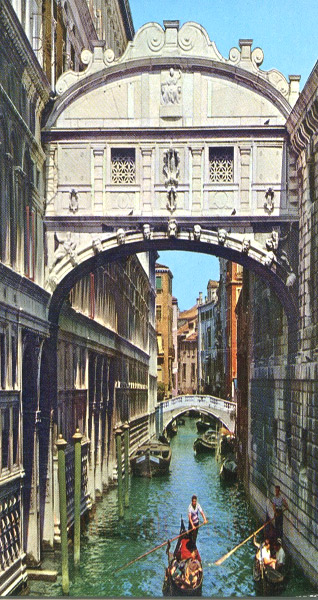Travel
Meritocracy & Venice's Bridge of Sighs
T. SHER SINGH
DAILY FIX
Saturday, November 24, 2012
It was dark, cold and drizzling as we rode the boat into Venice one late evening a number of winters ago.
Pencils of light danced in the shadows. Colours sparkled as if we were in a crystal shop. It was like doing Charon’s trip to Hades in reverse, this time leaving behind turmoil and arriving in a land of peace and tranquility.
Over the next few days, the more we saw of the city, the more we liked it.
And the more we found out about its historical government and justice system, and its legendary acumen in trade and commerce, the more eager we became to study it further.
Dazzled by the success of this city-state during the past centuries in ensuring prosperity for its citizens, I felt compelled and eager to seek out more about its inner workings.
What I found most intriguing was its self-description: Meritocracy. That is, its traditional form of government was led by only those who had merit.
Just what we need back home, I said to myself, and frantically dug deeper.
Those who voted and those who stood for election were not treated as equals, as would happen in a democracy today. Each person was accorded points and importance in accordance with his education, occupation, success and contribution to the state in the form of taxes.
Women, as always, were excluded.
Thus, you accumulated a specified number of credits for having a university education, for example. A few more credits for paying a high level of taxes. Some more for belonging to a profession which was high in demand. And so on and so forth.
Thus, they avoided the criticism that we often face in our own society today, for giving one vote to Albert Einstein, and one vote to, say, a person who went no further than Grade 6 and has always been living on public welfare.
What was most interesting about the Venetian system, however -- it lasted until the end of the 18th century when Napoleon came along and replaced it -- is that they remained a prosperous kingdom through the centuries, even while other nations suffered from the ravages of war, plague and historical forces.
They maintained a booming economy throughout the period, with employment for all of its citizens.
All of this despite the fact that Venice was essentially no more than a handful of little islands, with little support or backup from any other power.
The obvious conclusion one wants to jump to is: it’s a marvel of meritocracy! It made me hunger for more information about that wonder state.
But as I dug through treatises on the Venice of old, I also came across an interesting item in our own newspapers back home.
A newsletter published by Mensa (a private group whose members have to be above the genius level of an IQ of 132) were reported to have given “support to the concept of a ’master race.’ They also suggested that the ’mentally infirm’ should be ’humanely dispatched,’ and said that homeless people ‘should be done away with, like abandoned kittens.’ “
Hm-mm-m.
Well, when one talks of a meritocracy, one cannot ignore the brilliant minds that make up the Mensa Society. After all, it must constitute some of the brightest people around.
The above report that I have quoted, albeit originating from only a few of its members, gives us an inkling of the tendency a group of highly meritorious people can take, if given power to rule over the rest.
There is a reason why Sikhi insists on pairing ‘munn neevaa(n)‘ with ‘mutt ucchi’ - wisdom grounded in humility!
History has no dearth of examples of actual implementation of a principle such as the one espoused by some of these Mensa geniuses.
The Nazis, as we know, considered themselves a highly cultured people and had deluded themselves into believing they had merit over other races. Remember what they did to the less “meritorious”? The Japanese too.
Both Christians and Muslims conducted holy wars over each other for centuries, merely because each thought their way was more meritorious. The only difference between the two was linguistic: one group called its mission a ‘crusade‘, the other named it a ‘jihad‘.
Then, colonists from every continent began to maraud neighbours and distant lands, raping, pillaging and plundering, while propounding two asinine fantasies: that they had a superior religion and that their skin complexion gave them the right to greater, even exclusive, privileges. It didn’t take long for those theories to crumble into the dust, once they saw the light of day.
With my thoughts jogged by the Mensa story, I went back to my books on Venice.
I began to notice mention of torture chambers.
Secret trials.
Citizens who suddenly disappeared, and were never heard of again.
And, ah yes, the Bridge of Sighs.
Let’s stick to democracy for a while.
In the meantime, I reiterate: Venice is an enchanting city.
Conversation about this article
1: Rosalia (Baltimore, Maryland, USA), November 24, 2012, 5:31 PM.
Love this piece. The Bridge of Sighs.
2: Pritam Singh Grewal (Canada), November 25, 2012, 12:31 AM.
'Munn neevan mutt ucchi' - a wonderful quintessence of our ardaas! An unparalleled pairing of humility and wisdom!
3: Baldev Singh (Bradford, United Kingdom), November 26, 2012, 8:14 AM.
Italians are, in many ways, like Sikhs! They love and live life to the fullest and are fiery ... and always decent to strangers.



